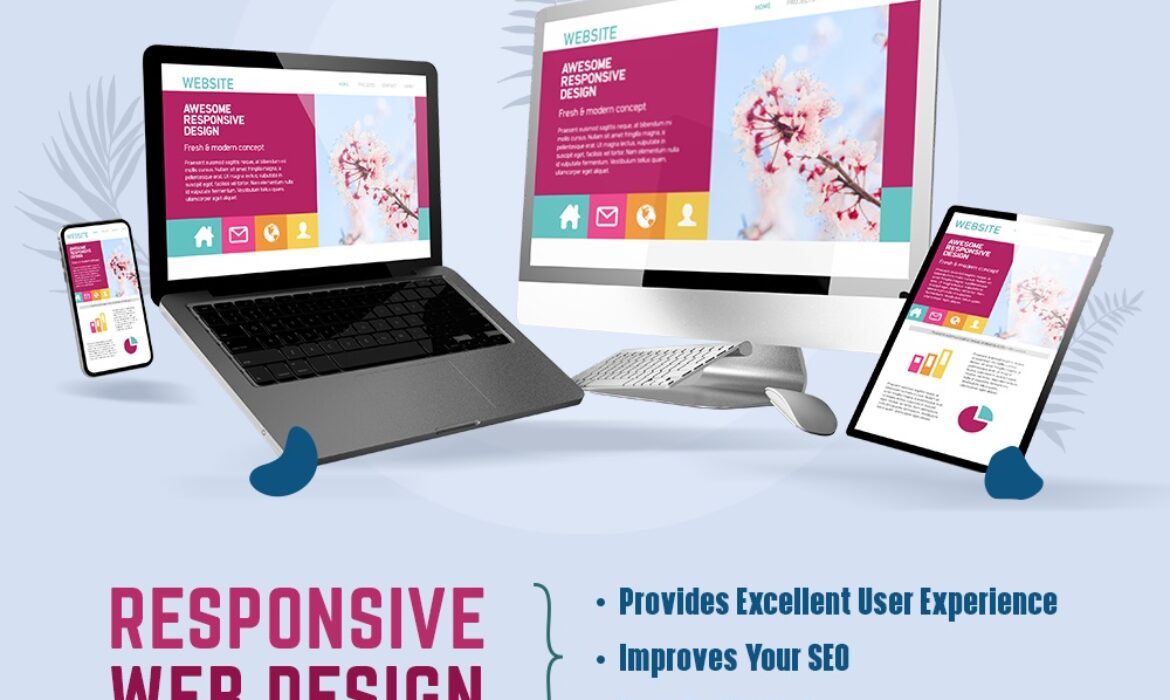In the dynamic landscape of the digital era, having a strong online presence is essential for businesses and individuals alike. A responsive website design is a critical component in ensuring that your online platform is not just visually appealing but also accessible and user-friendly across various devices. In this article, we will delve into the importance of responsive website design and how it can positively impact user experience, search engine rankings, and overall business success.
1. Adaptability Across Devices:
One of the primary reasons for investing in responsive website design is the ever-growing variety of devices used to access the internet. Gone are the days when users relied solely on desktop computers. Today, people use smartphones, tablets, laptops, and even smart TVs to browse the web. A responsive website design ensures that your site adapts seamlessly to different screen sizes and resolutions, providing a consistent and optimal experience for users regardless of the device they are using.
2. Enhanced User Experience:
User experience (UX) is a pivotal factor in determining the success of a website. A responsive design contributes significantly to a positive user experience. When visitors can easily navigate and interact with your site, they are more likely to stay longer, engage with your content, and convert into customers. Conversely, a poorly optimized website that requires constant zooming, scrolling, and resizing can frustrate users, leading to high bounce rates and diminished credibility.
3. Improved SEO Performance:
Search engines, particularly Google, prioritize mobile-friendly websites in their rankings. Google’s algorithms consider mobile-friendliness as a crucial factor when determining search results. A responsive website design is a key element of mobile optimization, signaling to search engines that your site is user-friendly on various devices. This, in turn, can positively impact your search engine rankings, making your website more visible to potential visitors and customers.
4. Cost-Effectiveness:
Maintaining separate versions of a website for different devices can be both time-consuming and expensive. A responsive design streamlines this process by eliminating the need for multiple websites or extensive modifications. With a single, responsive website, you can reach a broader audience without the added costs of managing and updating multiple versions. This not only saves money but also ensures consistency in your brand message and design across all devices.
5. Faster Loading Times:
Speed is a critical factor in retaining online visitors. Responsive websites are designed to load quickly, regardless of the device or screen size. This is particularly important for mobile users who may have slower internet connections. Faster loading times not only contribute to a positive user experience but also have a direct impact on SEO, as search engines favor websites that load quickly.
6. Increased Conversion Rates:
A responsive website design can have a direct and positive impact on conversion rates. When users have a seamless experience navigating your site on their preferred device, they are more likely to take the desired actions, such as making a purchase, filling out a form, or subscribing to a newsletter. A website that is optimized for conversions across various devices ensures that you are not missing out on potential customers due to usability issues.
7. Future-Proofing Your Website:
The digital landscape is constantly evolving, and new devices with different screen sizes and resolutions are regularly introduced to the market. Investing in a responsive website design is a forward-thinking approach that helps future-proof your online presence. By ensuring your site is adaptable to emerging technologies, you can stay ahead of the curve and maintain a competitive edge in the ever-evolving digital marketplace.
8. Global Accessibility and Reach:
A responsive website design contributes to global accessibility, allowing businesses to reach a broader and more diverse audience. With the increasing globalization of markets, catering to users worldwide is essential for expanding your brand’s reach. A responsive site ensures that people from different regions, with varied devices and internet connectivity, can access your content seamlessly. This inclusivity not only enhances your online presence but also opens up new opportunities for engagement and customer acquisition on a global scale.
9. Analytics and Reporting Simplification:
Managing analytics and tracking user behavior becomes more straightforward with a responsive website. Instead of dealing with separate data sets for different versions of your site, a unified approach streamlines the analytics process. This simplification enables businesses to gain a comprehensive understanding of user interactions, preferences, and demographics, facilitating informed decision-making and targeted marketing strategies.
10. Brand Credibility and Trust:
A professionally designed and responsive website instills trust and credibility in your brand. Users often associate a polished, user-friendly online presence with a reputable and trustworthy business. In contrast, a website that appears outdated or doesn’t function well on various devices may raise concerns about the professionalism and reliability of the brand. By investing in a responsive design, you not only meet user expectations but also contribute to building a positive brand image in the eyes of your audience.
In essence, the importance of responsive website design goes beyond technical optimization; it plays a crucial role in shaping the overall perception of your brand. By embracing responsiveness, businesses can create a positive digital environment that fosters user trust, engagement, and loyalty, ultimately leading to sustained success in the competitive online landscape. As technology continues to advance, the significance of responsive design will remain a cornerstone of effective digital strategy, ensuring adaptability and excellence in the ever-evolving world of the internet.
In conclusion, the importance of responsive website design cannot be overstated in today’s digital age. It is a fundamental aspect of providing an optimal user experience, improving search engine rankings, and ultimately driving business success. As technology continues to advance, businesses and individuals must prioritize a responsive design to ensure that their online presence remains accessible, appealing, and effective across the diverse range of devices used by today’s internet users.














